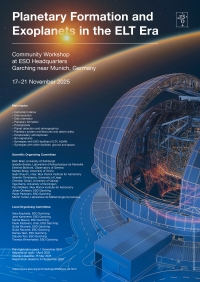
Rationale
Understanding how giant and rocky planets form and evolve, their internal structure and that of their atmosphere, represents one of the major challenges of modern astronomy, which is directly linked to the ultimate search for life by 2040. At the Horizon 2028-2030, the Extremely Large Telescope (ELT) will shine its first light on the sky. The high angular resolution and the great collecting capacity associated with the extreme sensitivity of the instruments will allow unprecedented observations of the regions of planetary formation and exoplanetary systems. In this perspective, the ESO community has developed a key expertise on the study of the initial conditions of planetary formation, the search for exoplanets, the atmospheric characterisation of giant and rocky exoplanets, and the search for biomarkers. This community includes various international laboratories and scientists who are also heavily involved at a technical and scientific level in the construction, scientific preparation and operation of the ELT instruments, and who have the opportunity to play a key role in ensuring a global return and shared success in the exploitation of the ELT.
In that context, the main objectives of the Exo-ELT community workshop are:
informing the ESO community about the status, schedule, modes and performances of the MORFEO/MICADO, HARMONI, METIS, MOSAIC, ANDES and PCS instruments;
presenting and revisiting together the science that will be addressed by the ELT, the scientific cases, samples, strategies of observation, calibration, data analysis and interpretation tools of the programmes dedicated to the study of the planetary formation and exoplanets;
fostering collaboration and synergy within the community to harmonize our efforts, tools and strategies for the preparatory work on the ELT programmes dedicated to this topic within the framework of the guaranteed time and the open time. This includes in particular work on source selection, simulation and data analysis tools and calibrations, preparatory observations involving different observational techniques, but also synergies of our programmes with those of space instruments and missions (ALMA, Gaia, VLT/I-2030, JWST, PLATO, ARIEL, Roman, SKA, etc.) The key is to optimize the scientific return for our community and our observation programmes in guaranteed and open time on the ELT.
Potential topics:
Instrument Status
Disk evolution
Disk chemistry
Planetary formation
Protoplanets
Planet detection & demographics
Planetary system architectures & debris disks
Exoplanetary atmosphere
Bio-signatures
Synergies with ESO facilities (VLT/I, ALMA)
Synergies with other facilities: ground and space
The workshop will be held at the ESO headquarters in Garching near Munich. Registration fees apply.
E-mail: exo-elt@eso.org

